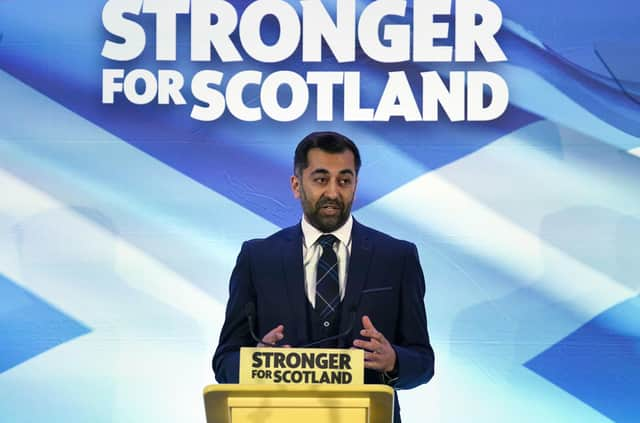Exclusive:Voters split on SNP independence strategies but reaching 60 per cent Yes support is most popular, poll shows


Growing support for independence to at least 60 per cent in the polls is the most popular route to independence among all voters, SNP voters, and those who say they would vote Yes in a second independence referendum, a new poll shows.
However, voters are fundamentally split on what would be the “best” strategy for the party to achieve its goal of independence, underlining the strategic cul-de-sac the SNP has found itself in.
Advertisement
Hide AdAdvertisement
Hide AdThe poll was undertaken by Savanta for The Scotsman with 1,002 Scottish adults interviewed online between October 6 and 11.
Chris Hopkins, the political research director for the polling firm, said the results show how “far-fetched” the SNP’s claim to have an “authoritative enough position to have legitimate demands for a second referendum” continue to be while the party remains battling crisis after crisis.
SNP members will head to the P&J Arena in Aberdeen today to vote on the party’s independence strategy, with Humza Yousaf hoping whatever is decided will allow the party to move on and focus on the general election.
Before the conference, the SNP leader urged his party to stop talking about the process of securing independence and said it would be “done” after the vote.
The First Minister, alongside the SNP leader in Westminster Stephen Flynn, have put forward a motion which would see the SNP aim for the most seats at the next general election.
This would then see the Scottish Government “empowered to begin immediate negotiations with the UK Government to give democratic effect to Scotland becoming an independent country”.
Other options set to be debated include a potential “de facto” referendum at the 2026 Holyrood election or standing candidates under a united “Scotland for independence” banner – pushed most stridently by Alex Salmond’s Alba Party.
Senior SNP figures admit growing support for independence to at least 60 per cent is what is required.
Advertisement
Hide AdAdvertisement
Hide AdThat figure was quoted by Alister Jack, the Scotland Secretary, as a potential trigger for a second independence referendum.
Voters are most likely to support focusing on growing support, with this strategy having the only positive “net support” among all voters, with 45 per cent of Scots backing it and 34 per cent opposing it.
SNP voters and those who back independence are also most likely to support this strategy.
A de facto referendum is most likely to be opposed by all voters, while standing united independence candidates received the least support (31 per cent) but also the least opposition (32 per cent). It is also the least popular option for SNP and independence supporters.
Yousaf and Flynn’s approach is the second most popular with the backing of 40 per cent of Scots, but is the second-most opposed (43 per cent). It is, however, the second most popular among SNP and Yes voters.
However, in results which demonstrate the potential no-win scenario for the SNP leadership, Scots were fundamentally split on what is the “best” approach.
In total, one in five (21 per cent) back growing support to 60 per cent, while the exact same proportion (21 per cent) would prefer the SNP leadership’s strategy. SNP voters prefer the leadership’s strategy over others, but only marginally.
Voters also now view the case for independence as being weaker than it was in 2014 for the first time in a year of asking the question.
Advertisement
Hide AdAdvertisement
Hide AdIn October last year ahead of the SNP conference, 44 per cent said the case was stronger with 30 per cent stating it was weaker.
This has now almost reversed, with 40 per cent stating it is weaker than it was around the first referendum and 34 per cent stating the argument had become stronger.
Chris Hopkins, political research director at Savanta, said: “The route to independence for the SNP looks further away than ever, despite polling on the independence question remaining remarkably static while the SNP’s ratings fall.
"Majorities of Scottish MPs in Westminster and MSPs in Holyrood no longer look like feasible targets and Yes polling above 60 per cent or the SNP above 50 per cent now seem a long way off, so how does the party for independence manoeuvre itself to be in a position to be able to force another vote?
"That will remain the question that will keep the SNP’s leadership awake at night as the next Westminster and Holyrood elections draw ever closer, but until the SNP gets its own house in order, it seems far-fetched that they’ll be in an authoritative enough position to have legitimate demands for a second referendum.”
Comments
Want to join the conversation? Please or to comment on this article.
